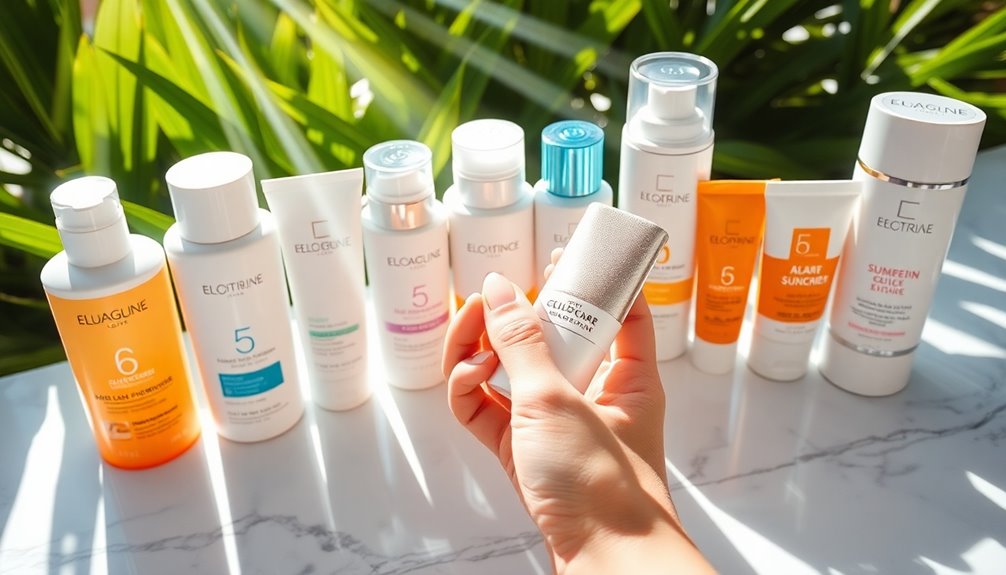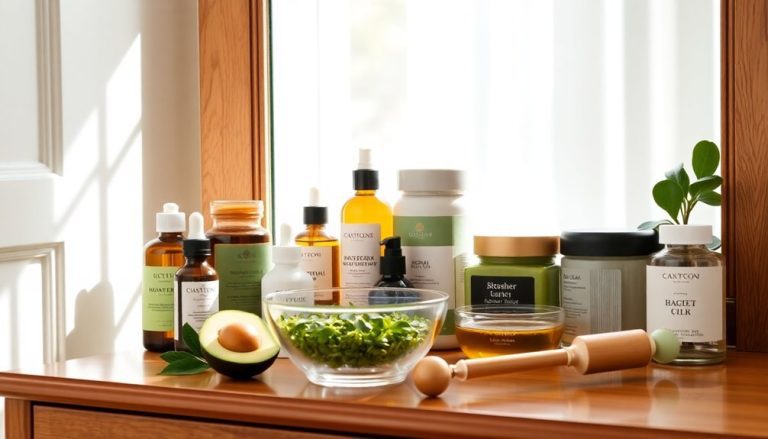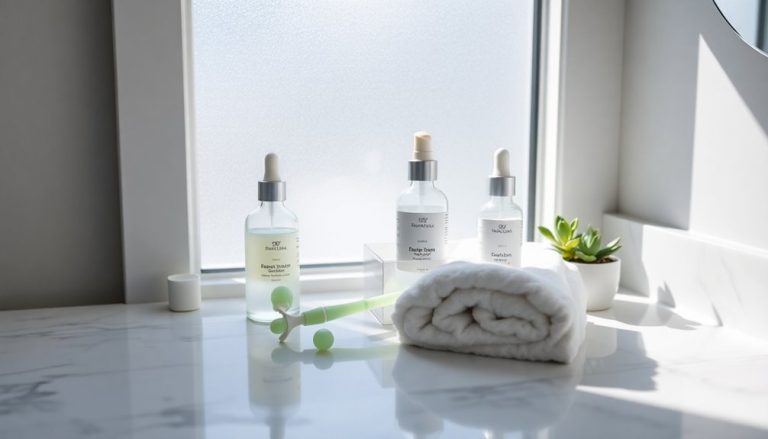When choosing face UV protection, start by understanding UV types: UVA causes aging, while UVB leads to burns. Look for broad-spectrum sunscreens with at least SPF 30. Check ingredients; opt for physical blockers like zinc oxide or soothing agents like aloe vera. Consider your skin type—lightweight for oily skin and hydrating for dry. Don't forget about water resistance if you sweat or swim. Always apply generously and reapply every two hours. Keep an eye on expiration dates, and store your sunscreen in a cool place. For more detailed insights on each of these tips, keep exploring!
Key Takeaways
- Choose a broad-spectrum sunscreen with at least SPF 30 to protect against both UVA and UVB rays effectively.
- Look for physical blockers like zinc oxide or titanium dioxide for reliable sun protection, especially for sensitive skin.
- Consider your skin type when selecting sunscreen; opt for lightweight formulas for oily skin and hydrating options for dry skin.
- Reapply sunscreen every two hours, or more frequently if swimming or sweating, to maintain effective protection.
- Regularly check expiration dates and store sunscreen in a cool, dry place to ensure its effectiveness.
Understand UV Radiation Types
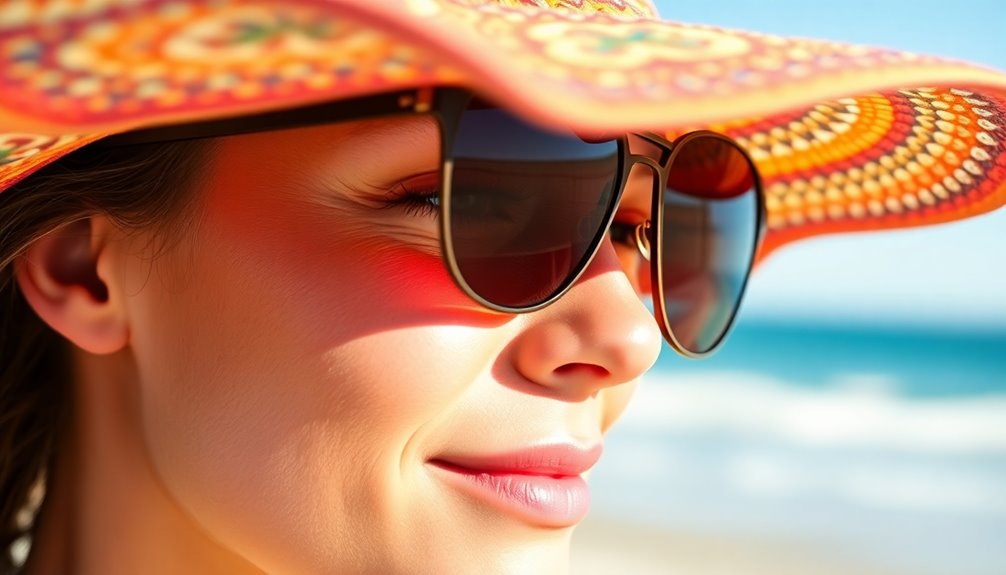
When it comes to UV radiation, many people aren't aware of the different types and their effects on your skin. There are two primary types you should know about: UVA and UVB.
UVA rays penetrate deeply into your skin, contributing to premature aging and increasing your risk of skin cancer. They're present all year round and can even penetrate through windows, so it's crucial to protect yourself from them, even on cloudy days. Using products like sunscreen sticks can make application easier and more effective.
On the other hand, UVB rays are responsible for causing sunburn and play a significant role in developing skin cancer. These rays vary in intensity depending on the season and time of day. You'll notice that UVB rays are strongest during midday and in the summer months.
Understanding these types helps you make informed choices about sun protection. If you're serious about keeping your skin healthy, look for broad-spectrum sunscreen that shields against both UVA and UVB rays.
Additionally, it's important to apply sunscreen generously and reapply every two hours, especially when engaging in outdoor activities, to maximize sun protection effectiveness. This way, you can safeguard your skin from the harmful effects of UV radiation, ensuring you maintain a youthful appearance and reduce your risk of serious skin issues down the line.
Check SPF Ratings
Understanding the types of UV radiation lays the groundwork for making smart choices about sun protection, particularly when it comes to checking SPF ratings.
SPF, or Sun Protection Factor, indicates how well a sunscreen can protect your skin from UVB rays, the primary cause of sunburn and skin cancer.
When choosing a sunscreen, look for a product with an SPF of at least 30. This level blocks about 97% of UVB rays, providing adequate protection for most skin types. Additionally, many sunscreens now include anti-redness cream to help soothe irritated skin while providing sun protection.
If you have fair skin or plan to spend extended time outdoors, consider higher SPF ratings, like 50 or more, to enhance your defense against harmful rays.
It's also essential to remember that SPF only measures UVB protection. While higher numbers offer more UVB protection, they don't guarantee full safety against UVA rays, which also contribute to skin damage and aging.
So, checking the SPF rating is crucial, but it shouldn't be your only focus. Combine your SPF knowledge with other sun safety practices for optimal protection. Additionally, consider using products that contain hyaluronic acid to help maintain hydration and support skin health while protecting against the sun.
Apply sunscreen generously and reapply every two hours, especially after swimming or sweating, to maintain effective coverage.
Look for Broad-Spectrum Protection
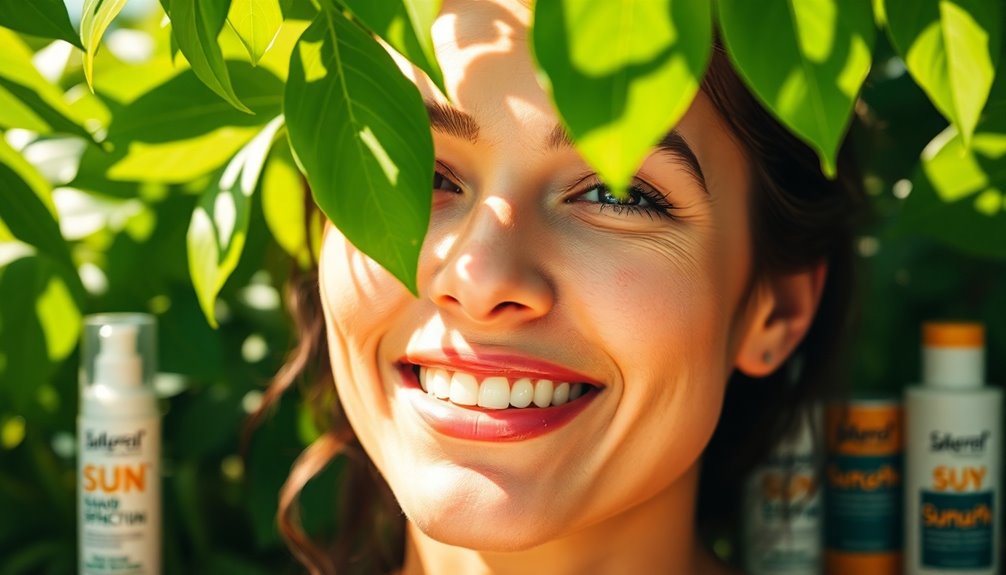
Choosing a sunscreen that offers broad-spectrum protection is essential for comprehensive skin defense.
Broad-spectrum means the formula shields you from both UVA and UVB rays. UVA rays penetrate deep into your skin, causing premature aging and increasing your risk of skin cancer. On the other hand, UVB rays are the primary culprits behind sunburn and can also contribute to skin cancer.
When you're shopping for face UV protection, always check the label for "broad-spectrum." This ensures you're getting well-rounded protection that addresses multiple threats to your skin.
Without this designation, you might only be protected against UVB rays, leaving your skin vulnerable to the harmful effects of UVA exposure. Additionally, incorporating Vitamin C serums into your skincare routine can enhance your skin's defense against UV damage.
Consider Your Skin Type
Taking your skin type into account is crucial for selecting the right face UV protection. Different skin types react differently to sun exposure and UV products.
If you have oily skin, look for lightweight, oil-free formulations that won't clog your pores. These products typically absorb quickly and leave a matte finish, which helps control shine throughout the day.
For those with dry or sensitive skin, choose a sunscreen that contains hydrating ingredients like hyaluronic acid or glycerin. These will help maintain moisture while providing the necessary UV protection. You might also want to consider mineral sunscreens, as they're often gentler on sensitive skin and less likely to cause irritation.
If you have combination skin, you can opt for a product that balances both oily and dry areas. Look for non-comedogenic options that provide adequate hydration without feeling greasy.
Lastly, if you have darker skin, remember that UV exposure can still cause damage, so broad-spectrum protection is essential.
Ultimately, understanding your skin type will guide you in selecting a sunscreen that not only protects but also complements your skin's unique needs.
Choose Water-Resistant Formulas
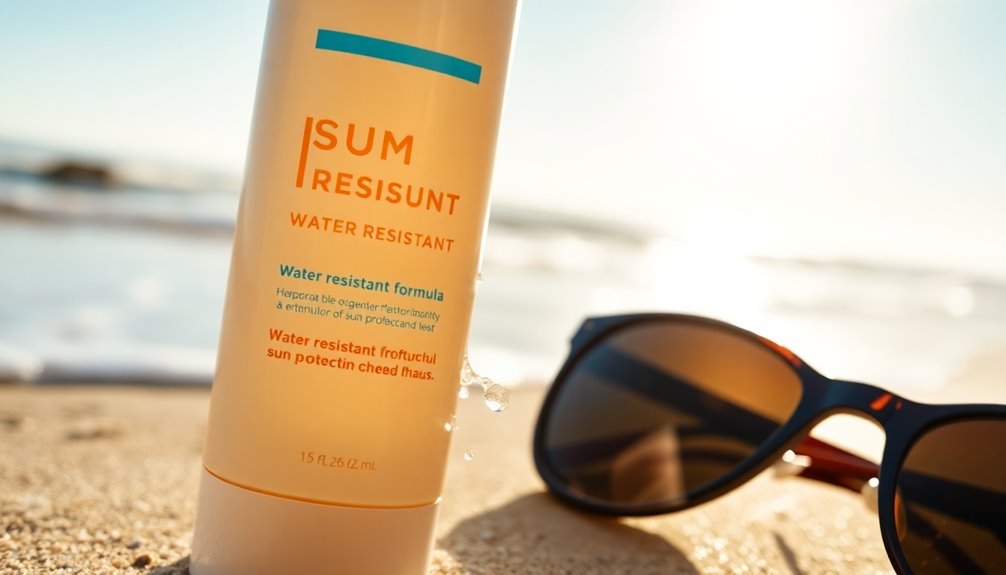
Opting for water-resistant formulas is essential when selecting face UV protection, especially if you plan to spend time outdoors, swim, or sweat. Regular sunscreens can wash off easily or lose effectiveness when exposed to moisture, leaving your skin vulnerable to harmful UV rays.
Water-resistant products are designed to stay on your skin longer, providing that extra layer of protection you need.
When you choose a water-resistant sunscreen, look for labels that specify the duration of effectiveness, such as "40 minutes" or "80 minutes" of resistance to water and sweat. This gives you a clear idea of how often you'll need to reapply.
Remember, even the best water-resistant formulas require reapplication after swimming or heavy sweating, so keep that in mind during your outdoor activities.
It's also wise to apply your water-resistant sunscreen generously and evenly across your face. Don't forget areas like your ears and the back of your neck.
Explore Different Formulations
When it comes to face UV protection, you'll find a variety of formulations designed to meet different skin needs and preferences. Choosing the right one can make a big difference in how well your skin is protected while still looking and feeling great.
Here are three popular formulations to consider:
- Creams and Lotions: These are great for dry skin types. They provide hydration along with UV protection, making them ideal for daily use.
- Gels and Serums: If you have oily or acne-prone skin, gels or serums can be your best bet. They're lightweight, absorb quickly, and won't clog your pores, giving you the protection you need without the greasy feel.
- Sprays: Perfect for on-the-go protection, spray formulations are easy to apply. Just remember to reapply throughout the day, especially if you're spending time outdoors.
No matter your skin type or lifestyle, there's a formulation out there that'll work for you.
Explore your options to find one that fits seamlessly into your daily routine, ensuring you stay protected while looking fabulous!
Pay Attention to Ingredients
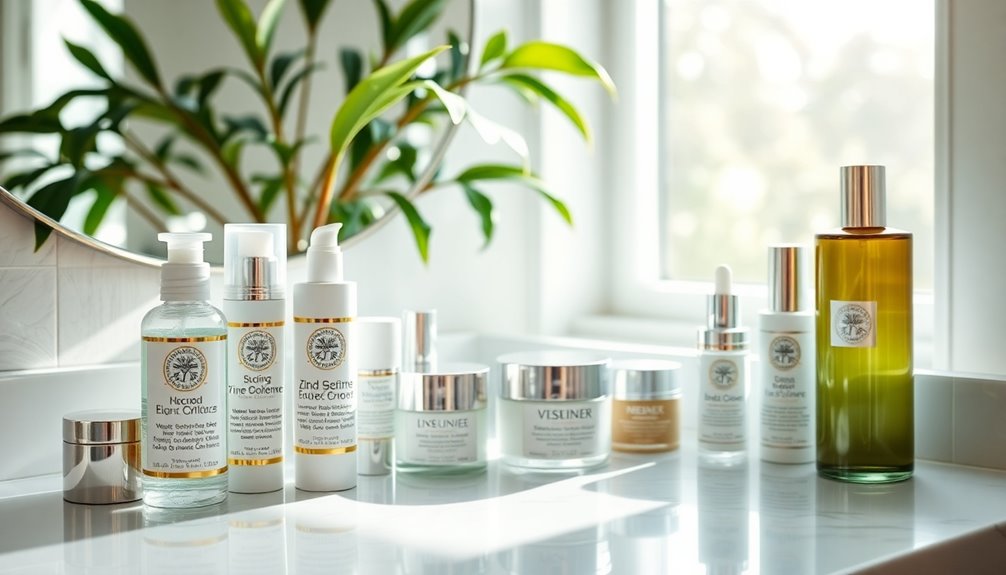
Many people underestimate the importance of ingredients in their face UV protection products. When you're shopping for sunscreen, it's vital to read the label closely. Look for broad-spectrum formulas that protect against both UVA and UVB rays.
Ingredients like zinc oxide and titanium dioxide provide mineral protection, creating a physical barrier on your skin, while chemical filters like avobenzone and octisalate absorb UV radiation.
Avoid products with harmful additives, like parabens or synthetic fragrances, which can irritate your skin or cause allergic reactions. Instead, opt for formulas with soothing ingredients such as aloe vera or hyaluronic acid, which can hydrate and calm your skin while providing protection.
You should also consider your skin type. If you have oily or acne-prone skin, look for non-comedogenic products that won't clog your pores. For dry skin, choose a moisturizer with a higher SPF that includes nourishing ingredients.
Don't forget to check the expiration date. Sunscreens lose effectiveness over time, so ensure you're using a recent product for optimal protection.
Don't Forget About Application
Proper application of sunscreen is just as crucial as choosing the right product. Many people overlook this step, but how you apply sunscreen can significantly affect its effectiveness.
Here are three essential tips to ensure you're getting the most out of your UV protection:
- Use Enough Product: Don't skimp on the amount. Aim for about a nickel-sized dollop for your face alone. Applying too little won't give you the full protection you need.
- Apply It Evenly: Make sure you cover all areas of your face, including often-missed spots like your ears, neck, and the back of your hands. Take your time to spread it out evenly, so every inch is protected.
- Allow It to Absorb: Give your sunscreen a few minutes to soak into your skin before stepping outside. This helps create a more effective barrier against harmful UV rays.
Reapply Regularly
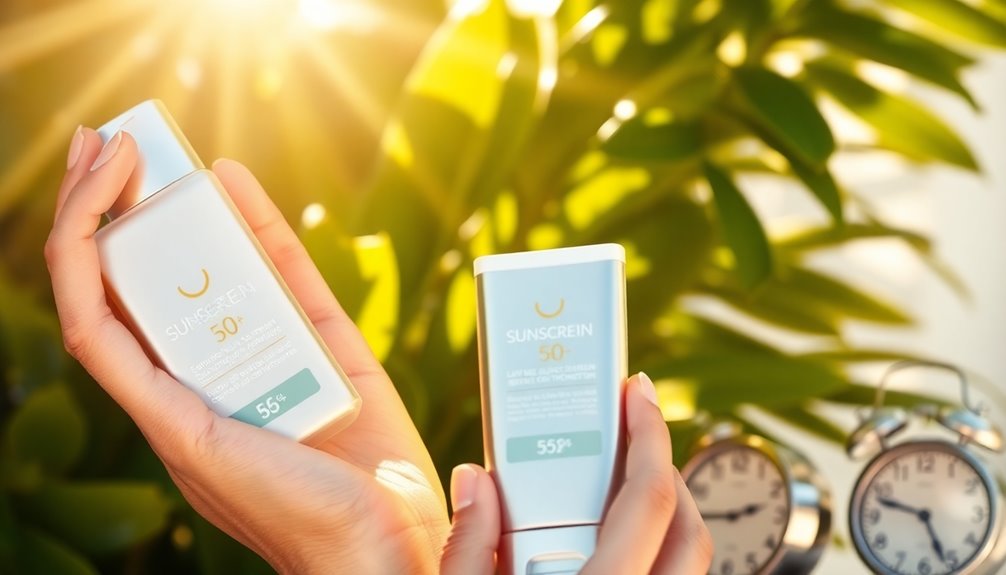
Even with the right application, sunscreen loses its effectiveness over time, so reapplying regularly is key to maintaining protection.
It's important to know that sweat, swimming, and even just daily activities can wear down your sunscreen. Aim to reapply every two hours, or more frequently if you're sweating or swimming.
When you're outdoors, set a timer on your phone to remind you to reapply. If you're using a makeup product with SPF, it can be tricky to reapply without disrupting your look.
Consider using a spray or powder sunscreen specifically designed for face application. These products can easily fit into your bag and allow for quick touch-ups throughout the day.
Don't wait until you feel the sun's heat before reapplying. By then, it might be too late, and you could risk sunburn.
Make reapplication a part of your routine, just like applying moisturizer or makeup. This way, you'll ensure your skin stays shielded from harmful UV rays, keeping it healthy and youthful.
Be Mindful of Expiration Dates
Sunscreen's effectiveness can diminish over time, so it's crucial to be mindful of expiration dates. Using expired sunscreen not only compromises your protection against harmful UV rays but also puts your skin at risk.
Here are three tips to help you stay on top of expiration dates:
- Check the Label: Always look for the expiration date on the sunscreen bottle. Most sunscreens have a shelf life of about three years, but some may expire sooner. If you can't find a date, it's better to replace it.
- Store Properly: Keep your sunscreen in a cool, dry place, away from direct sunlight. Extreme temperatures can affect its potency and lead to quicker expiration.
- Monitor Usage: If you only use sunscreen occasionally, consider purchasing smaller bottles to ensure you use them before they expire. This way, you won't waste product, and your skin will always be protected.
Frequently Asked Questions
Can UV Protection Be Applied Over Makeup?
Yes, you can apply UV protection over makeup. Use a lightweight, spray-based sunscreen or a powder sunscreen for easy application. It'll help maintain your makeup while providing the necessary protection from harmful UV rays.
Are Mineral Sunscreens Better Than Chemical Ones?
When deciding between mineral and chemical sunscreens, you'll find mineral options offer immediate protection and are less irritating for sensitive skin. However, chemical sunscreens may absorb better and feel lighter. Choose what works best for you!
How Much Sunscreen Should I Apply to My Face?
You should apply about a nickel-sized amount of sunscreen to your face. Make sure to cover all areas evenly, including your ears and neck, for complete protection against harmful UV rays. Don't forget to reapply!
Is It Safe to Use Sunscreen on Sensitive Skin?
If you've ever felt a stinging sensation after applying products, you're not alone. Yes, it's generally safe to use sunscreen on sensitive skin, but opt for a fragrance-free, hypoallergenic formula to minimize irritation.
Can I Use Expired Sunscreen Products?
You shouldn't use expired sunscreen products. They lose effectiveness over time, leaving your skin unprotected. Always check expiration dates and opt for fresh products to ensure proper UV protection during your outdoor activities.
Conclusion
In your quest for quality UV protection, remember these crucial considerations. Prioritize potent SPF, seek broad-spectrum barriers, and select solutions suited to your skin. Stay savvy about ingredients, apply appropriately, and don't neglect reapplication. With vigilance and a little extra care, you can shield your skin from the sun's harmful rays. Embrace radiant, resilient skin as you bask in the beauty of sun-soaked days, confident that you're protected and prepared for whatever comes your way!

